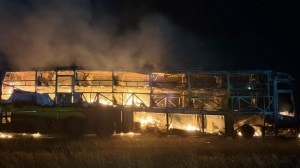An FIR by Jammu & Kashmir police against the Army for killing of three civilian protesters in Shopian has divided ruling coalition partners BJP and PDP. Army personnel fired on protesters who were allegedly pelting them with stones Saturday; two persons died that day and the third died Tuesday.

In J&K, where armed forces enjoy protection under the Armed Forces Special Powers Act (AFSPA), the process of justice for victims of alleged atrocities by the armed forces is complex. Though police have registered a case, previous such instances show that it does not necessarily mean the Army men, if charged by police, will have to face the court.
Story continues below this ad
Read | No counter-FIR in Shopian firing, Army’s version included: J&K police
Going by data from the Ministry of Defence, none of the previous cases has ever proceeded to the stage of prosecution. AFSPA makes it mandatory for the state government to seek sanction from the ministry before prosecuting any Army personnel. And sanction has been denied each time.
On January 1 this year, the government told Rajya Sabha that from 2001 to 2016, the MoD received 50 requests of sanction for prosecution from the J&K government. The ministry denied sanction for prosecution in 47 cases while the other three cases are pending before it. Of the 50 cases, 17 pertained to alleged killing of civilians, 16 to custodial deaths, 8 to alleged custodial disappearances and 4 to alleged rape and molestation.
Also Read | Duty of govt to take probe to logical conclusion, says J&K CM Mufti
Story continues below this ad
The Army maintains that its and men and officers accused of human rights violations will be tried in its own courts. In most of the cases pending in civilian courts in J&K, the Army has argued that these be transferred for court martial. Two of these cases, Pathirabal and Machil, have become symbolic of a trend.
Pathribal 2000
The Army chose to court-martial the accused soldiers and exonerated them at the evidence stage.
Five Army officers were alleged to have killed five civilians on March 24, 2000, and dubbed them foreign militants of the Lashkar-e-Toiba (LeT). The Army announced before then home minister L K Advani that the “five militants” were responsible for the killing of 35 Sikhs at Chittisinghpora village, south Kashmir, four days previously.
A public outcry led to the J&K government exhuming the five bodies, DNA tests confirmed they were civilians who had gone missing from south Kashmir some days previously. The CBI took over the case, charged the five Army officers with the civilian killings, in the court of the Srinagar chief judicial magistrate.
Story continues below this ad
The Army first argued that they could not be prosecuted under AFSPA. This was turned down in the trial court and later J&K High Court. The Army then went to the Supreme Court, which gave it an option — prosecution in a criminal court or court-martial — and the Army chose the latter. After the “summary of evidence” stage, the Army court said there was no evidence to prosecute the officers.
Machil 2010
On April 29, 2010, the Army claimed to have killed three militants while they were trying to infiltrate into the valley at Machil area of Kupwara. A police probe found that three civilians had been lured for jobs, taken to the Line of Control at Machil and killed in a fake encounter to claim promotion and awards. A case was registered against Army officers and men at the CJM’s court in Sopore. The Army got the case transferred for court-martial.
The Army court sentenced the six accused, including a colonel and a captain, to life imprisonment for killing three civilians in a fake encounter. But the men were bailed out after the Armed Forces Tribunal suspended the sentence pronounced by the court martial.

 Shopian residents mourn Rayees Ahmad Ganie, 19, who died Tuesday, the third victim of firing Saturday. (Express Photo: Shuaib Masoodi)
Shopian residents mourn Rayees Ahmad Ganie, 19, who died Tuesday, the third victim of firing Saturday. (Express Photo: Shuaib Masoodi)






